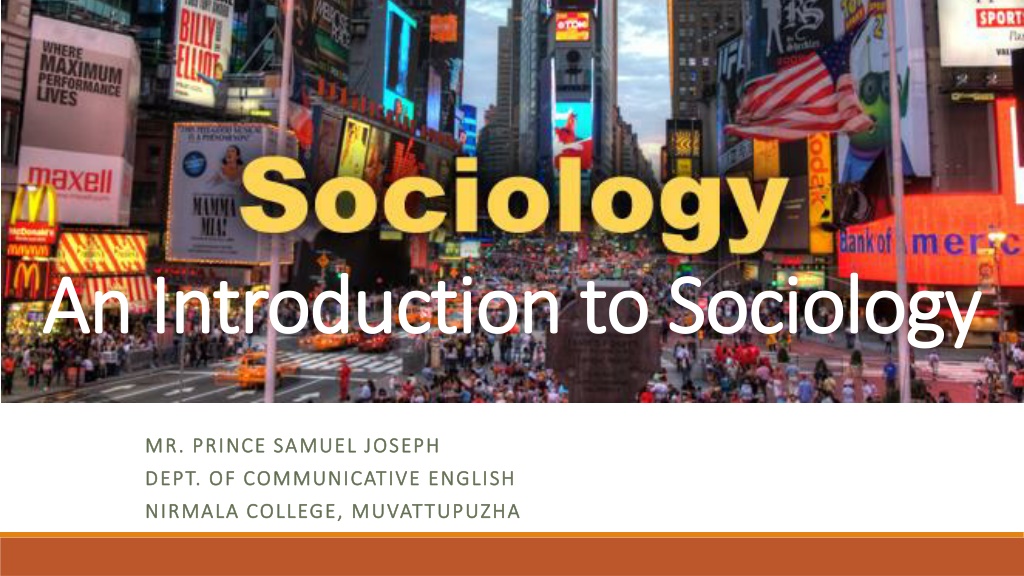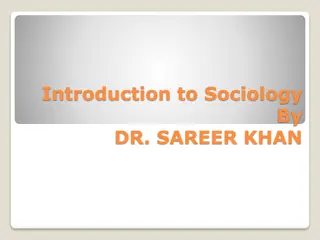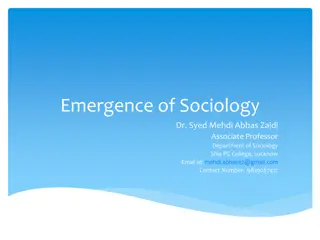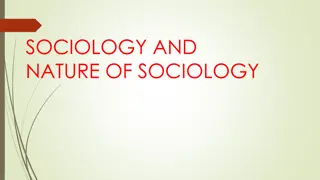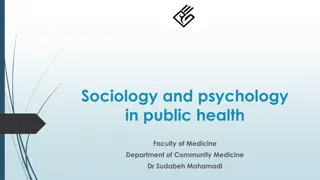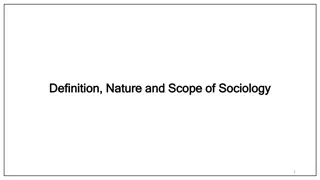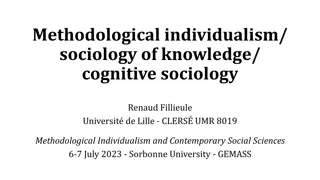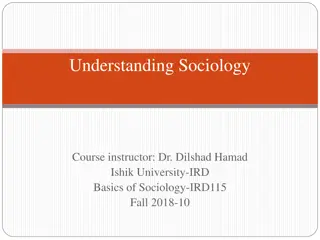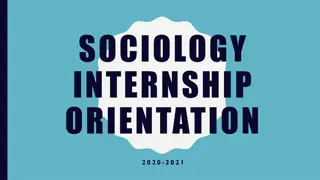Understanding Sociology: Definition, Characteristics, and Importance
Sociology, the scientific study of society, explores the social nature of humanity, social relationships, institutions, problems, and more. It delves into the characteristics of sociology as an independent, categorical, and generalizing science and discusses its uses in enriching culture, aiding social planning, and tribal welfare. The subject matter includes analyzing society, studying social institutions and processes, and developing concepts and theories. Despite debates on its scope, sociology remains a crucial discipline with both intrinsic value and practical utility in understanding and addressing modern social issues.
Download Presentation

Please find below an Image/Link to download the presentation.
The content on the website is provided AS IS for your information and personal use only. It may not be sold, licensed, or shared on other websites without obtaining consent from the author. Download presentation by click this link. If you encounter any issues during the download, it is possible that the publisher has removed the file from their server.
E N D
Presentation Transcript
An Introduction to Sociology An Introduction to Sociology MR. PRINCE SAMUEL JOSEPH MR. PRINCE SAMUEL JOSEPH DEPT. OF COMMUNICATIVE ENGLISH DEPT. OF COMMUNICATIVE ENGLISH NIRMALA COLLEGE, NIRMALA COLLEGE, MUVATTUPUZHA MUVATTUPUZHA
Introduction Science Branches of Science Formal Science Life Science Physical Science Social Science Social Relationships and Social Environment Various Social Sciences History, Political Science, Psychology, Economics, Anthropology, Religion Sociology and other Social Sciences
Sociology: Definition and Meaning Sociology: Definition and Meaning Word Origin Socius Companion/ Associate Etymological Meaning: Logos Study Science of Society Auguste Comte French Social thinker Positive Philosophy 1839 Definition AugusteComte Kingsley Davis Morris Ginsberg
Characteristics of Sociology Independent Science Social Science Categorical not Normative Discipline Pure not applied Abstract not concrete General not special Social science Generalizing not particularizing (Inductive Method) Rational and empirical
Uses or Importance Scientific study of Society Social nature of man Understanding our own society Understanding other society Enriching culture Social Institutions Social problems Teaching subject Help underdeveloped countries Tribal welfare Social planning Practical utility- sociological techniques Intrinsic worth and dignity of man Up-to-date with modern social situations
Subject Matter of Sociology Sociological Analysis of Society Study of Primary units Social Institutions- development, structure, functions Social Processes Research-rational and empirical Concepts, Propositions, Theories Specializations
Scope of Sociology Specialistic / Formalistic School Advocates George Simmel, Vierkandt, Von Wiese, Tonnies, Small Arguments Pure and Independent Science Limited scope Forms not Contents Part of Social Relationships Criticism Narrowed the scope Forms & Contents not workable Other Social Sciences too study Pure sociology is impractical, Now its interdisciplinary approach
Scope of Sociology Synthetic school Sociology is a general social science not special Encyclopedic Advocates- Emile Durkheim, Hob House, Ginsberg, Sorokin Emile Durkheim Social Morphology Social Physiology General Sociology Morris Ginsberg Social Morphology Social Control Social Processes Social Pathology
Beginnings of Sociology Oldest and newest Old age- Plato, Aristotle, Manu, Cicero Middle age-Adam Smith, Thomas Moore, Thomas Hobbes, Francis Bacon Modern age- Auguste Comte, Spencer, Durkheim, Weber Characteristics of Early Sociology Evolutionary/ encyclopedic/ modelled upon biology/ ideological& scientific Contemporary sociology (19th,20thcentury)- Simmel, Karl Marx, Cooley, Malinowski, Ginsberg, MacIver, Sorokin Sociology in India-G.S.Gurye, K,M.Kapadia, M.N. Srinivas After World War I Sociological Bulletin, Journal of Social Sciences
Pioneers of Sociology Pioneers of Sociology AUGUSTE AUGUSTE COMTE, HERBERT SPENCER, KARL MARX, EMILE COMTE, HERBERT SPENCER, KARL MARX, EMILE DURKHEIM, MAX WEBER DURKHEIM, MAX WEBER
Auguste Comte French Contributions Name and foundation Scientific approach, objectivity, positive approach Scientific method Pure and applied science Positivism Law of 3 stages (Sciences, Society,Human thinking) Theological stage Metaphysical stage Scientific / positive stage Hierarchy of sciences Social statics and dynamics Theoretical Sociology Moral order Sociological literature
Herbert Spencer First systematic study Fields of Sociology- Family, Politics, Religion, Social Control System approach Parts and Whole/ Individual and Society Harmony of society Organic analogy/ Organismic theory Supported Comte Laws of Evolution- Biological/ Social Works Principles of Sociology/ Principles of Ethics/ Social Statics/ The Study of Sociology
Karl Marx Philosopher Change the world Social Conflict and revolution Social classes- Capitalists and laborers Conflict approach
Emile Durkheim Importance to society Social Facts Comparative Sociology Specialisations in sociology General Sociology Sociology of Religion Crime Economic Sociology Works The Division of Labour in Society Suicide
Max Weber Importance to individual- basic unit Ideal Types Method of understanding Works Economics and Society Protestant Ethics and Spirit of Capitalism The City
Factors contributing to the emergence of Sociology Industrialization and Industrial Revolution Industrial Revolution and Mechanisation Agrarian society> Industrial Society Farming> Factory Rural Area> Urban Area> Urbanisation Dangerous factory Conditions Social Problems Solution to social problems
Factors contributing to the emergence of Sociology Growth of Natural Sciences Well developed Scientific methods Application of these methods in Society? Colonial Empires European colonization Radical diverse societies and cultures Intellectual challenge
Society Meaning Definition Characteristics People Mutual interaction and awareness Likeness Differences Cooperation and division of labor Interdependence Dynamic Social control Culture Gregariousness/ gregarious instinct
Society Types of society Herbert Spencer Complexity Simple Compound/ clan Double compound/ tribe Trebly compound/ nation states Structure Military society Compulsory cooperation Religious Supremacy of state over individuals Industrial society Voluntary cooperation Secular Supremacy of individual
Community Definition Characteristics Locality Community sentiment Stability Naturalness- Origin & Membership Size- Big/Small Regulations
Differences: Differences: Society Community Concept We feeling Locality Small Concrete Less varied More likeness Concept We feeling may or may not be Locality not compulsory Wider Abstract Varied interests Likeness and differences
THANK YOU THANK YOU
